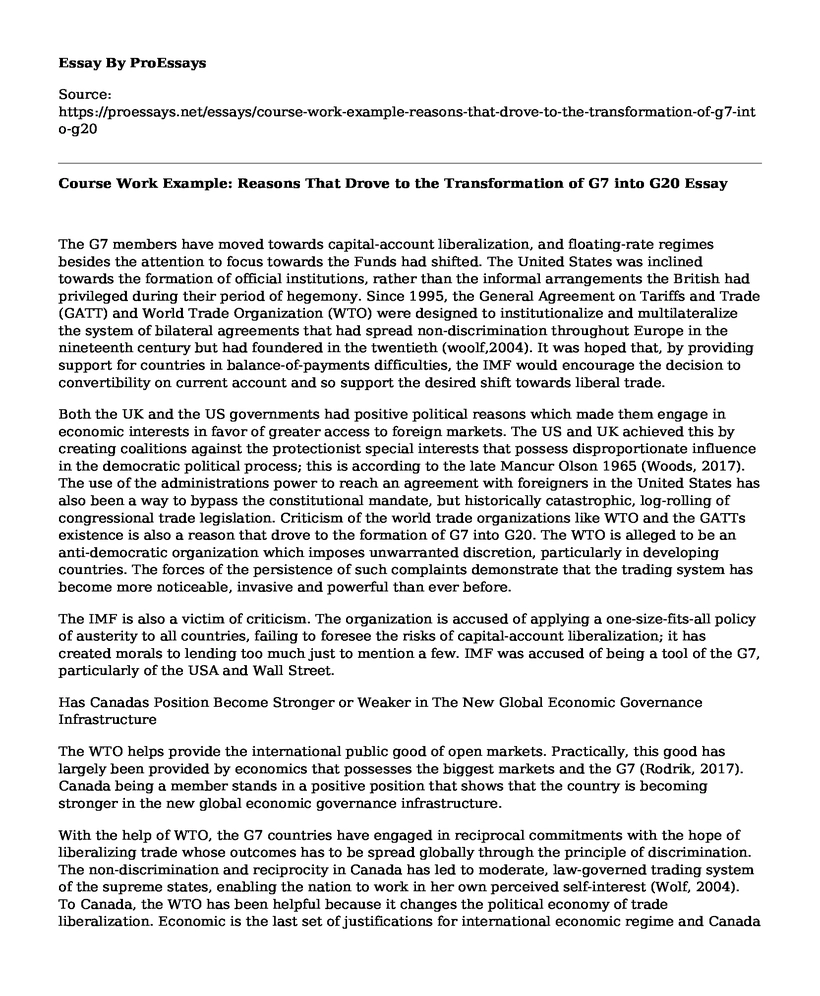The G7 members have moved towards capital-account liberalization, and floating-rate regimes besides the attention to focus towards the Funds had shifted. The United States was inclined towards the formation of official institutions, rather than the informal arrangements the British had privileged during their period of hegemony. Since 1995, the General Agreement on Tariffs and Trade (GATT) and World Trade Organization (WTO) were designed to institutionalize and multilateralize the system of bilateral agreements that had spread non-discrimination throughout Europe in the nineteenth century but had foundered in the twentieth (woolf,2004). It was hoped that, by providing support for countries in balance-of-payments difficulties, the IMF would encourage the decision to convertibility on current account and so support the desired shift towards liberal trade.
Both the UK and the US governments had positive political reasons which made them engage in economic interests in favor of greater access to foreign markets. The US and UK achieved this by creating coalitions against the protectionist special interests that possess disproportionate influence in the democratic political process; this is according to the late Mancur Olson 1965 (Woods, 2017). The use of the administrations power to reach an agreement with foreigners in the United States has also been a way to bypass the constitutional mandate, but historically catastrophic, log-rolling of congressional trade legislation. Criticism of the world trade organizations like WTO and the GATTs existence is also a reason that drove to the formation of G7 into G20. The WTO is alleged to be an anti-democratic organization which imposes unwarranted discretion, particularly in developing countries. The forces of the persistence of such complaints demonstrate that the trading system has become more noticeable, invasive and powerful than ever before.
The IMF is also a victim of criticism. The organization is accused of applying a one-size-fits-all policy of austerity to all countries, failing to foresee the risks of capital-account liberalization; it has created morals to lending too much just to mention a few. IMF was accused of being a tool of the G7, particularly of the USA and Wall Street.
Has Canadas Position Become Stronger or Weaker in The New Global Economic Governance Infrastructure
The WTO helps provide the international public good of open markets. Practically, this good has largely been provided by economics that possesses the biggest markets and the G7 (Rodrik, 2017). Canada being a member stands in a positive position that shows that the country is becoming stronger in the new global economic governance infrastructure.
With the help of WTO, the G7 countries have engaged in reciprocal commitments with the hope of liberalizing trade whose outcomes has to be spread globally through the principle of discrimination. The non-discrimination and reciprocity in Canada has led to moderate, law-governed trading system of the supreme states, enabling the nation to work in her own perceived self-interest (Wolf, 2004). To Canada, the WTO has been helpful because it changes the political economy of trade liberalization. Economic is the last set of justifications for international economic regime and Canada being a part of many countries that have liberalized simultaneously; she enjoys multiple economic gains.
Canadas economic infrastructure can improve and become much stronger in the new global economy if the WTO will consider making labialization its focus on trade once again. The institution has become too concerned with the harmonization of regulatory standards, starting with Trade-Related Intellectual Property (TRIPs) (Wolf, 2004). Many countries are still involved in negotiations. The WTO is working towards becoming like the UN where there shall be debates to reach an agreement instead of effective negotiations among countries that wish to liberalize, first in their own interest. Most countries most prefer unilateral liberalization than engaging in protracted negotiations over whose outcome they will have very minimal influence.
References
Rodrik, D. (2017). The False Economic Promise of Global Governance. Project Syndicate. Retrieved 9 May 2017, from https://www.project-syndicate.org/commentary/global-governance-false-economic-promise-by-dani-rodrik-2016-08?barrier=accessreg
Wolf, M. (2004). Globalization and Global Economic Governance. Oxford Review of Economic Policy, 20(1), 72-84. http://dx.doi.org/10.1093/oxrep/grh005
Woods, N. (2017). Global Institutions after the Crisis. Project Syndicate. Retrieved 9 May 2017, from https://www.project-syndicate.org/commentary/the-empty-promise-of-global-institutions-after-the-crisis-by-ngaire-woods?barrier=accessreg
Cite this page
Course Work Example: Reasons That Drove to the Transformation of G7 into G20. (2021, Jun 15). Retrieved from https://proessays.net/essays/course-work-example-reasons-that-drove-to-the-transformation-of-g7-into-g20
If you are the original author of this essay and no longer wish to have it published on the ProEssays website, please click below to request its removal:
- Essay Sample on Termination Process
- Essay Sample on Fair Compensation Scheme
- Employment Law - Research Paper
- Essay Sample on Canada and Germany Food Trade
- Essay Sample on Employee Compensation and Benefits: Impacting Lives Beyond Payment and Mentoring
- Globalization: Impact on Financial, Social and Psychological Well-Being - Research Paper
- Essay Example on Greece's Economic Crisis: Impact and Causes







